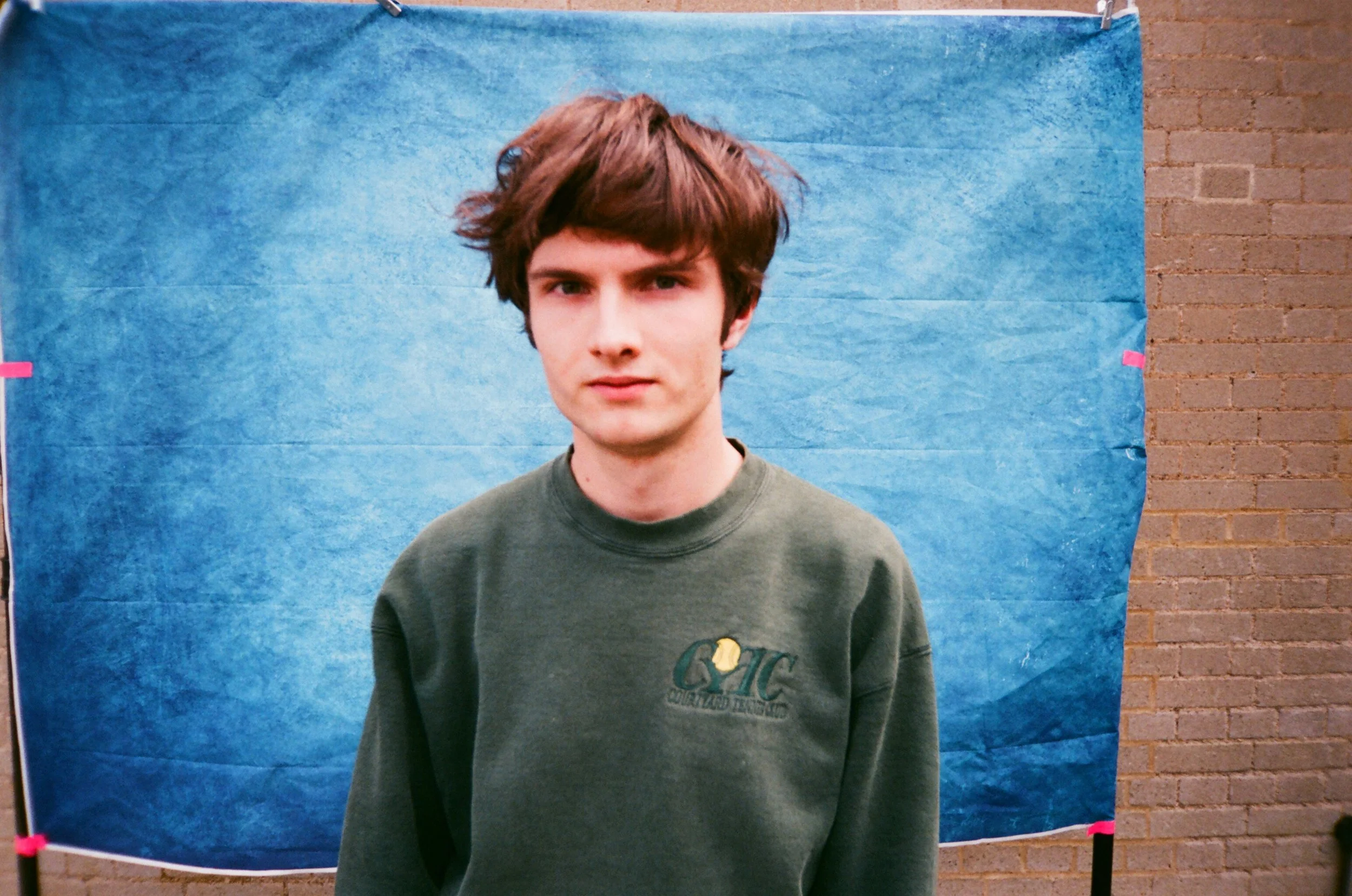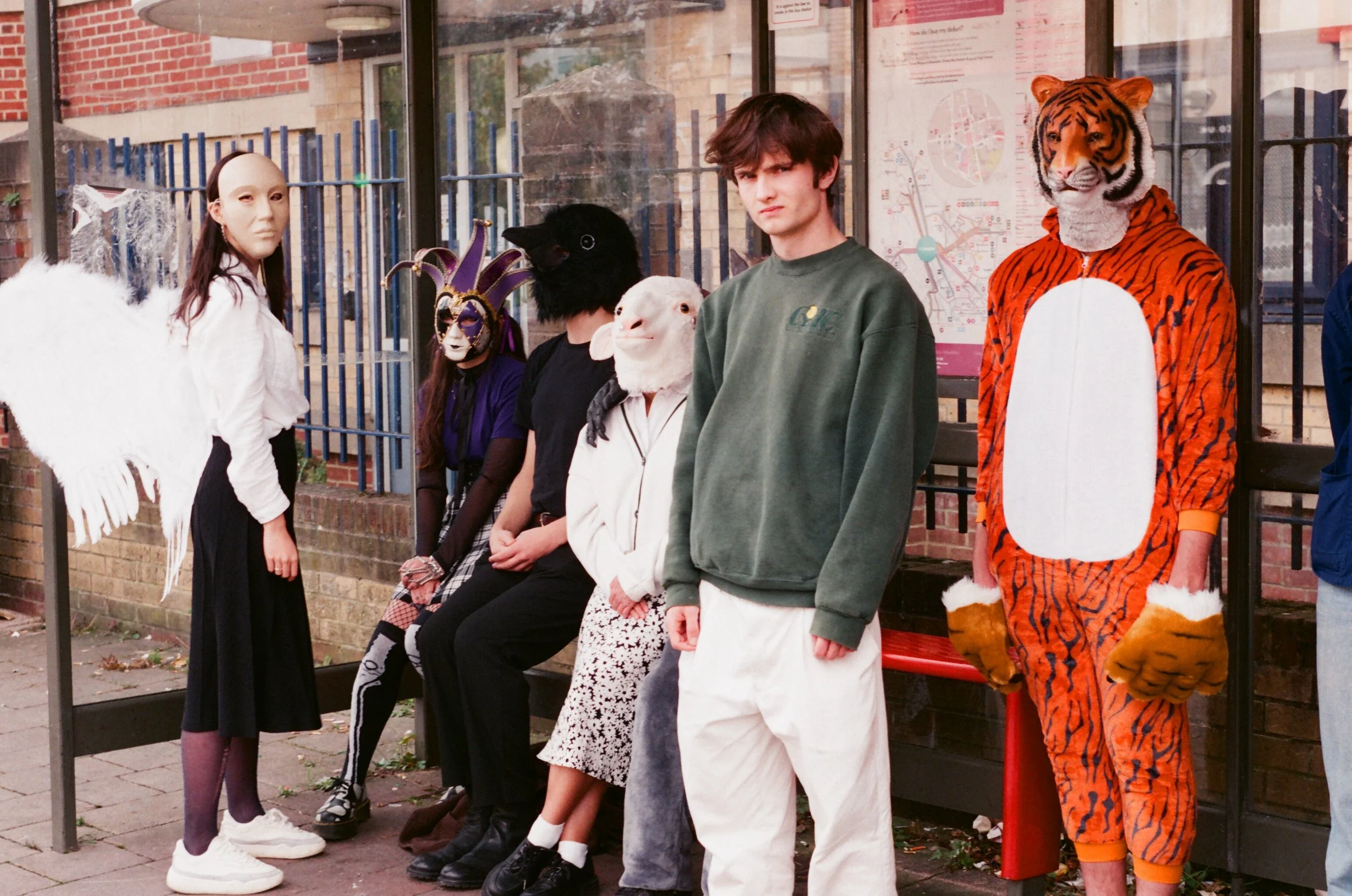A conversation with UK-based indie pop artist Max Blansjaar.
Max Blansjaar on touring, classical piano, and his new album False Comforts.
photo by Siobhan Cox.
Max Blansjaar released his first EP, Spit It Out!, at just fifteen, recording songs on an old laptop during school.
Now at twenty-one—another EP and a single later—Blansjaar has released his first full-length album, False Comforts, which explores uncertainty and change through its surreal lyrics and a simpler sound.
I had the opportunity to chat with Max Blansjaar about the new EP.
Evgenia: You just released an album, and you're playing shows around the UK. How has that been going?
Max: We just came back from tour a couple days ago, and it was really good. Really exhausting, though. And it's also very easy to just eat junk and drink beer all day. You have to really watch yourself because you'll get to somewhere at 4 p.m. and then load-in isn’t until 5, so you're like, “Oh, we'll have a drink,” and then you load in and you have to wait for the soundcheck. And it's like, “Oh, we're in a bar, we may as well have one.” And then you get your rider and it's like 28 beers and then they give you food, which is usually pizza because it's easy. It was challenging in ways I didn't necessarily expect, in terms of endurance and stamina. But it was great. And the reception's been really nice. We've got a bunch of really nice reviews. I'm happy and kind of winding down a little bit now.
E: Could you tell me a bit more about False Comforts and what influenced it?
M: I wrote it all and then recorded it with Katie Von Schleicher in Brooklyn, over the course of around 10 days of recording sessions. It's the collection of songs that I wrote when I was just finishing school and starting university. I was in this weird middle period where everything felt a little strange and uncertain. And I felt very small in a lot of ways. I was trying to figure out how everything was working and where I fit into the bigger picture. And I sort of wanted to capture that sense from lots of these different angles. There’s a number of years between all the songs, so I think I approach it from different ways.
I was listening to a lot of 90s indie music, a lot of Elephant Six stuff, a lot of Daniel Johnston and Jeffrey Lewis, and all these pretty straight down the line indie performers who use some very simple building blocks to create more complex stuff. So that's what I was kind of trying to get at.
E: Your first EP came out when you were 15. How has your music evolved?
M: When I was 15 or 16, I was self-recording and self-producing on this old laptop at my school. And I would usually do it in 45 minute bursts, so the music was very impulsive. There were just a lot of layers since I rarely deleted anything. And I was still kind of getting to grips with the technology, even. It's pretty wild and not always thought through. I don't necessarily mean that in a self deprecating way, just like, I was very much going off of my first instincts, I suppose. And I think over time, I've gotten a bit more careful, for better or for worse, because you know, I think it is a trade-off, artistically.
Also, because it's my first time working with a producer, they bring an extra layer of thought to the process. Katie and Nate, who produced the record, are people who do things very carefully, and will spend 10 minutes mic-ing up the guitar just right, so you can do like five seconds of a riff, which was unheard of to me. I think I've gotten more careful and less sure of what I was doing. Because I used to be kind of overconfident and too assured in my music-making, whereas now I feel like I'm a lot more uncertain about pretty much everything that I do.
photo by Siobhan Cox.
E: You started off as a classical pianist. How did you make that transition from classical piano to indie pop?
M: I've been playing piano since I was four years old. And my sister was playing in punk bands, which she still does. So she was playing gigs locally. And I saw her do that and I was like, “Oh, that's really cool.”I went to see her shows where I could, because I was too young to be allowed into most places. And then I was like, “Oh, I kind of want to do this.” She taught me to play guitar. It was basically her who facilitated it. And, from there, I started writing songs. I think in some way, the classical piano upbringing has been helpful in terms of knowing a little bit of music theory and being able to think about harmony and stuff.
But also, there was something quite freeing about being able to kick against all the precision. You have to be really kind of disciplined. And when you're practicing piano, especially when you get to a higher level, you're really doing minute finger movements and stuff. I really enjoyed just strumming a guitar in a really loose way. It's a really nice way to let off steam, I guess.
E: Do you remember any of your earlier attempts at writing songs?
M: I only started when I was 14, and then when I was 15, the EP came out. That kind of was it. I would write a song and then be so impressed that I managed to write a song, that I would just stop and just play it for weeks on end. Cause I was like, “Wow, I've written this one.” I was just fascinated by that and would just play it over and over again.
It was very basic, because I was learning to actually play the guitar as well as learning to write songs. So I guess both of those things developed in tandem. I would not want to listen to anything from the first year. And then after that, it gets listenable, I think.
E: You’re 21, right?
M: Yeah.
E: It’s crazy to me that you have such a long discography by now.
M: It was partly because I was very lucky to find the label that I did. So Beanie Tapes who put out the album also put out my early EPs, and if they hadn't offered to do that, no one would have offered to do that, you know?
E: How did you end up working with the label?
M: So I met Julia-Sophie at this random event. I don't even remember. It was this music magazine event in Oxford and I'd asked her to play a show, you know, recently. So I kind of knew her face and I got talking to her and I mentioned that I make music, and she was like, “Oh, send me over the demos,” cause they were just starting out the label at this point. And so I did and then they wanted to put it out.
It was pretty much as simple as that. It was just good timing. And they happened to like the music, which was still a little rough around the edges, but they also helped develop it a little bit in places and get someone to actually mix it and stuff. The mixing engineer did a little more than you would usually expect a mixing engineer to do. But yeah, so I just got talking to her basically, and then they've put out everything that I've done since.
E: Are you playing any more shows? What’s next?
M: The tour is over now, so I'm just gonna have some sleep and then do another one, I guess. I don't know. I have to figure it out. Probably just write another album or something. But yeah, no shows on the horizon at the moment.
E: I had a lot of fun listening to the album.
M: Oh, great. That's good. It's always hard because I've been listening to it basically for a year nonstop. It's always hard when it comes out to remember that everyone else is just hearing it for the first time. Because my instinct is to be like, “Ah, it's done.” But then it's like, “No, everyone else is just hearing it now.” And you have to keep doing it.
False Comforts album cover.
edited by Alex Oder.
photos by Siobhan Cox.



